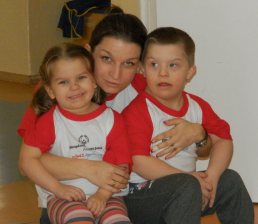EDITOR’S NOTE: The following is a guest post by David Evangelista, Acting President & Managing Director of the Special Olympics Europe-Eurasia Region.
Early morning practices. Evening team meetings. Coach counseling. Relentless training. Long travel to tournaments. Competition after competition. Incessant logistics.
Athlete training and competition brings with it a myriad of additional tasks, duties and responsibilities that one may not see on the medal podium but without them, there simply can be no participation. Behind each Special Olympics athlete there are parents and caregivers that make all of it possible. In so many ways, big and small, present and invisible, it is they that make so much of the Special Olympics Movement real.
The European Union and United Nations asks us to position sport not as a marketing right, but as a human right. Perhaps more than anything, the most marginalized groups across the world consistently reiterate that sport is so much more than kicking a ball, running a race, or scoring a basket. Within a global context defined more and more by fear and division, the athletes of Special Olympics offer a stark contrast to the prevailing messages of the day: instead of cynicism, they play with hope. Instead of greediness, they play with a love of the game. Instead of nationalistic rivalries, they celebrate excellence in effort and bravery among all. Their victory is not only the result of the same hard work that all athletes put in, but also of the courage to overcome extraordinary obstacles and redefine what is possible.
What most distinguishes a Special Olympics athlete is that when they play they never compete with anyone but themselves.
Their only aim is to do one thing: their best. They invite others to discover the best within themselves. And it is the parents and caregivers that understand the depth, simplicity and power of this proposition more than anything.
Today on 1 June the global community is being asked to mark The Global Day of Parents proclaimed by the UN General Assembly in 2012 to celebrate parents across the world. In the world of Special Olympics every day is Parents Day.
Research shows that active involvement from parents have a strong positive effect on the academic and life skills of children with intellectual disabilities, as well as on their adult lives. But they cannot do it on their own. EU-wide platforms such as the European Alliance for Families and COFACE – the Confederation of Family Organizations in the European Union – of which Special Olympics is a member, work on supporting parents of children with disabilities. Such meaningful collaboration extends the reach of family support networks, allowing parents to connect and share with one another.
In numbers comes strength.
The positive attitudes passed from one parent to another can reach across the borders of member states and enable more learning, advocacy, change and hope. The UN Convention on the Rights of Persons with Disabilities (CRPD) recognizes the role of families in the lives of people with disabilities and serves as a milestone for the promotion and achievement of equality and human rights across Europe. Various obligations under the CRPD commit policymakers to ensure families can fully and equally realize the rights enshrined in the text.
In Special Olympics, there are thousands of parents with powerful stories to tell.
Giuseppe Montemurri is the father of Filippo, a Special Olympics athlete with Down syndrome. He remembers that shortly after Filippo was born, another parent of a child with Down syndrome encouraged him by saying, “Your kid will be terrific if you help him in the right way.” This thought never left his mind. As part of his commitment, Giuseppe created a Special Olympics Family Support Network across Italy to involve parents in activities such as family camps and social camaraderie. There was no shortage of community-based engagement available to empower parents. As a Global Family Leader for Europe, Giuseppe is striving to bring more families into the Special Olympics network.

Anna Kozak-Zapala & family
Anna Kozak-Zapala is a coordinator for the Special Olympics Poland Early Childhood Development program. Seven years ago she gave birth to her son Filip who was born with intellectual disabilities. She discovered the Special Olympics Young Athletes Program which has transformed both of their lives. Young Athletes is about sport and play, but more importantly about creating the critical bonds between parent and child. Having worked as a physiotherapist, Anna knew this program would help her son’s development and her own. She took the initiative and started a Young Athletes Club in her son’s kindergarten.
Special Olympics, together with key partners like UNICEF, Lions Clubs International, and many more, take the play of sport very seriously. For children and young people with disabilities, it is the electrical current that has the power to shed light on what is otherwise a life shadowed in darkness. It is, for many Special Olympics athletes, the single opportunity to shed their labels and simply serve as a teammate, a position, an accepted part of the whole. It is this electricity of sorts that has brought over 5,000,000 Special Olympics athletes with intellectual disabilities to the field, to the court, and to the sports complex. Who creates this electrical current that brings so much energy, positivity and progress to the world? It is the parents and caregivers of Special Olympics athletes.
That is truly something at which to marvel.
NOTE: This guest blog is cross-posted on BlogActiv.eu.
